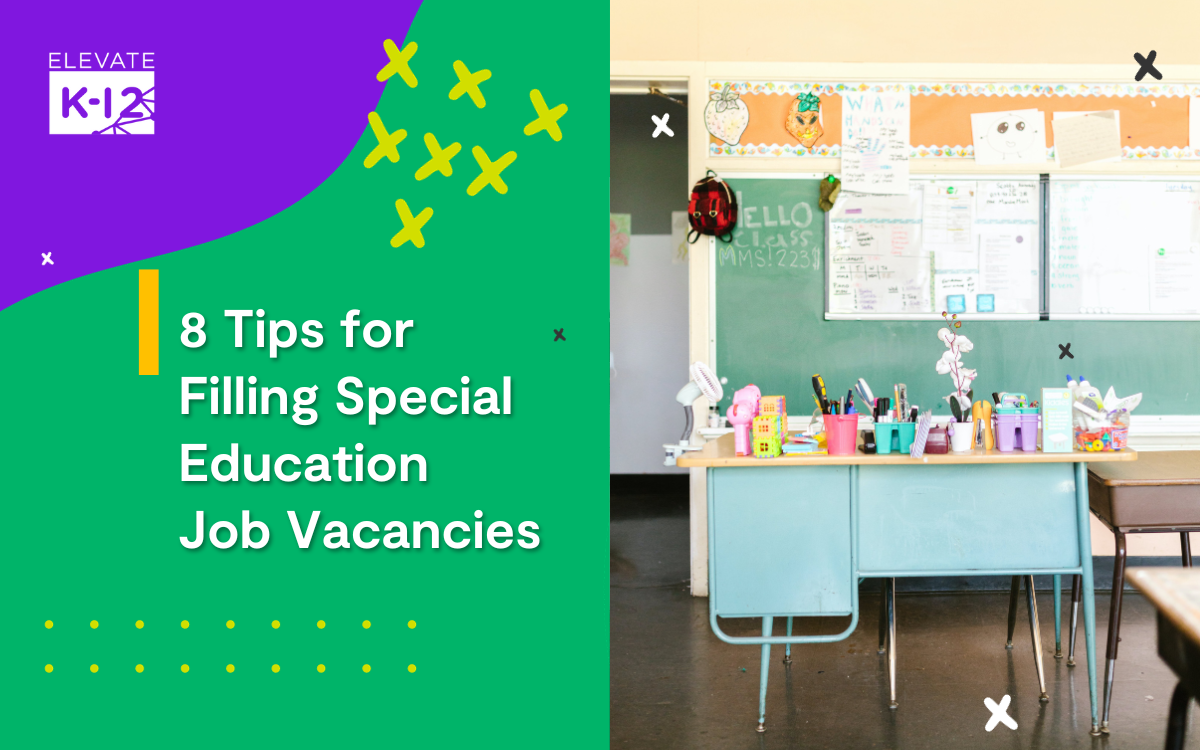The special education teacher shortage has hit school districts hard across the nation. If you’re struggling to fill special education roles, you’re not alone. Qualified special education candidates are scarce.
Schools have adapted by putting long-term substitute teachers or paraeducators with fewer qualifications in these positions. However, these students suffer without certified special education professionals who can meet their unique needs.
Fortunately, with a little creativity and technology, you can create a pipeline of candidates for the future and hire teachers to fill open spots right now.
What To Know About the Special Education Teacher Shortage
In August 2022, 65% of national public schools reported starting the school year understaffed in special education — more than any other category. The shortage affects all grade levels, from elementary school to high school.
The national teacher shortage affects all positions, but especially special education, due to increasing student needs and fewer resources to support special education teachers. In addition, when special education teachers quit, it’s typically because they are either retiring or leaving the profession altogether.
Becoming a certified special education teacher requires extra training on top of a bachelor’s degree. It varies depending on the state but may require extensive higher education and additional certifications — both time-consuming and expensive.
Meanwhile, like other educators, special education teachers face a high workload with low pay. All of this adds up to a career path with few incentives, resulting in fewer and fewer new teachers choosing the special education path.
Why Are High Turnover Rates for Special Education Teachers Problematic?
The Individuals with Disabilities Education Act (IDEA) established specific rights for children with special educational needs. In short, schools must meet the requirements of students with special needs by providing special education teachers and Individualized Education Programs (IEPs) at no cost.
When schools have high turnover or struggle to fill special education positions, it becomes challenging to fulfill the IDEA requirements. The consequences for students are significant.
Not only is their schooling disrupted, but students fail to receive necessary education services. Special education students often rely on routines and established relationships to feel comfortable at school and to succeed.
The effects can ripple across the entire school. Turnover and inadequate staffing levels can negatively affect morale, leading to further teacher burnout when other staff members must take on extra work.
In addition, if schools have low-quality, understaffed special education programs, it can negatively affect their reputation and make hiring more challenging across the board. The time and money schools spend recruiting and training can drain resources.
Challenges Faced in Retaining Special Education Teachers
Special education teachers face uniquely challenging circumstances compared to other teachers. Factors like a lack of resources and administrative support disproportionately affect them, increasing retention difficulties.
Lower Pay and Higher Workloads
Special education teachers often work under the same contract as regular teachers. So, despite the additional and expensive schooling, they earn the same as everyone else — and teachers already make low pay.
On average, teachers earn 26.4% less than their peers with similar education levels. They also work 50+ hour weeks. The low pay and high workloads drive people away from the profession.
Lack of Administrative Support
Research shows that special education teachers need administrative support to help them succeed. However, administrators are often incredibly busy overseeing an entire staff of overworked teachers while managing a tight budget. Sometimes, it’s challenging for administrators to offer special education teachers enough support.
Limited Professional Development
The extra certifications for special education can be too expensive and time-consuming for current teachers and paraprofessionals to pursue. In addition, due to low resources, existing special education teachers may not get the ongoing professional development they need to succeed and prevent burnout.
Few or Limited Resources Available
Students with IEPs often need additional specialized resources, which can be difficult for schools with tight budgets. A lack of resources can make a special education teacher’s job more challenging, driving them to find a district with more resources or leave the field entirely.
8 Tips and Strategies for Filling Vacant Special Education Roles
You’re already working hard to fill open positions in your district, but sometimes, an outside perspective can give you fresh ideas. Here are some ways to find the staff you need while navigating the special education teacher shortage.
1. Expand Your Recruiting Efforts
It’s worth getting creative with your recruiting efforts and using a multifaceted approach. Developing a relationship with local colleges can help you recruit future teachers before they even start applying. Encouraging training teachers to get special education certificates can also help you build your pipeline early.
District-specific job fairs can be another great resource, especially if you specifically target special education professionals. You could also find part-time candidates to complement your full-time staff.
Finally, removing geographic limitations can significantly widen your pool of candidates. Elevate K-12 makes it easy to find certified special ed teachers who can teach live, virtual lessons in your classrooms.
2. Offer Competitive Compensation Packages
It’s important to ensure you’re providing your teachers with competitive compensation aligned with your regional cost of living. If salaries catch up to inflation, it will be much more sustainable for teachers to stay in their roles.
You can also consider offering bonuses or housing stipends for special education teaching positions and including that in the job description. Even if you can’t offer a bigger salary, adding financial incentives might be enough to convince a special education teacher to join your school.
3. Foster a More Supportive, Cohesive Work Environment
More structured support can help reduce burnout among both your current and future special education teachers. For example, you could establish peer mentoring that pairs newer special ed teachers with veterans.
Since not all schools have a large number of special education teachers, a district-wide support network could help fill the gaps and better support teachers’ mental health.
Beyond offering core classes, Elevate’s certified special education teachers can also provide extra support. Some schools use Elevate’s LIVE teacher as a “double-dip” of grade-level content to meet instructional minutes for IEPs and improve gen ed performance.
Elevate’s LIVE teachers can also take on some of the responsibilities of your in-house special education teachers. This frees your teachers to focus on fulfilling IEPs, individual intervention, and monitoring student progress.
4. Invest in Professional Development Opportunities
Professional development specifically for special education teachers supports their continuing education and equips them with the latest strategies to succeed.
District-funded workshops and seminars can keep teachers current on the latest research. Sponsoring teacher attendance at special ed conferences helps connect your teachers with others who can provide support and inspire new ideas for working with students.
5. Use Technology and New Innovations
With the adoption of virtual classes accelerated by the pandemic, remote teaching is here to stay. If you take advantage of the latest technology, you can expand your candidate search to anyone certified in special education in your state. Grants are often available to help districts incorporate modern technology into their schools.
Elevate’s live, remote teaching model allows you to maximize student engagement and give extra support to in-person special education teachers.
6. Collaborate With Universities and Teaching Programs
Partnering with local teacher education programs can help you intervene early and encourage more future teachers to get special education certificates. You can offer internships focused on special ed, learning tracks specific to special ed, or send guest speakers to discuss special education teacher job opportunities.
With Elevate’s remote LIVE teaching resources, you can even provide enhanced training and prep opportunities for interested future teachers.
7. Emphasize Inclusivity and Diversity
Inclusivity and diversity are essential in special education classrooms. Having a variety of experiences and perspectives can help support students with different learning needs. Students with educational and social challenges might also be encouraged to see themselves represented in the workforce.
Emphasizing inclusivity can also help with hiring. A supportive environment will make your school an attractive workplace for teaching candidates. Plus, being open to recruiting candidates with diverse backgrounds can widen your candidate pool.
Grow Your Own programs, developed at the district level, recruit teachers from nontraditional populations such as high school students and paraprofessionals. These populations are more likely to reflect the diversity of the schools they work in, and they are also more likely to stay teaching in their own communities.
8. Make the Hiring Process Easier
Streamlining the hiring process can fill vacancies faster, freeing up time and resources to focus on recruiting. An efficient online application system can simplify tracking and reviewing applications. Online job postings on modern sites can also make it easier for candidates to find you.
When you partner with Elevate, you don’t have to worry about recruiting. Elevate has a network of over 1,000 qualified teachers with an average of 13+ years of experience. Our recruitment process involves intensive vetting, including a “mock class” interview, and we can fill any teacher vacancy at your school with an average lead time of two weeks.
Consider Elevate K-12 as a Partner in Filling Special Education Vacancies
Staffing special education teacher positions is a huge challenge. Our model gets results by combining live teaching and modern technology and integrating it seamlessly with your existing special ed program.
Elevate is a proven alternative to the traditional classroom model when candidates are unavailable locally. Our program can adapt to whatever gaps your district is experiencing.
Michael Harris, Senior Director of Talent Management at Milwaukee Public Schools, couldn’t find special ed teachers anywhere. After partnering with us, he quickly filled his special education classrooms with talented, certified teachers. He had this to say:
“The results were phenomenal. We honestly couldn’t believe how well it worked.”
If you want these results for your own schools, partner with Elevate today.

